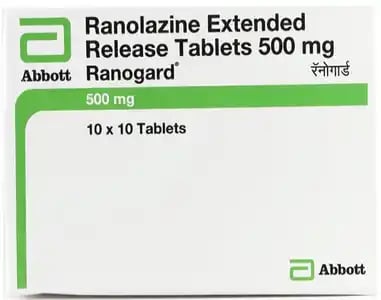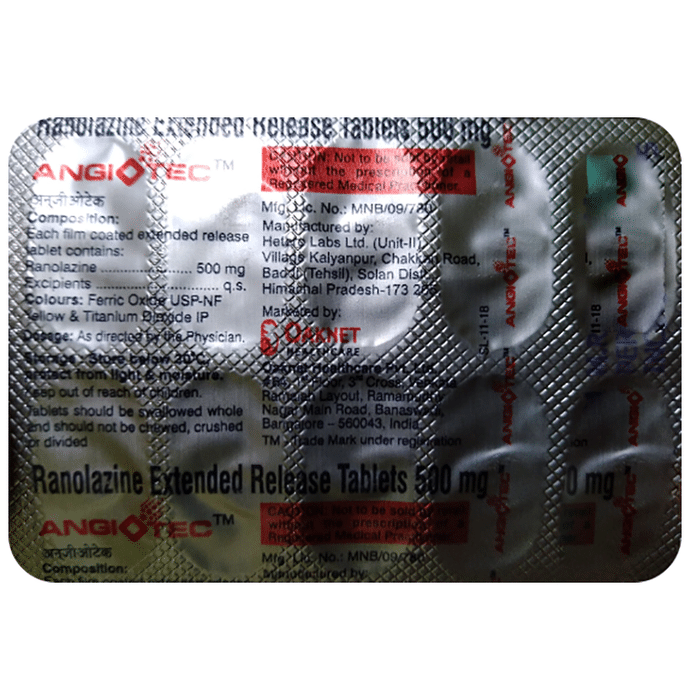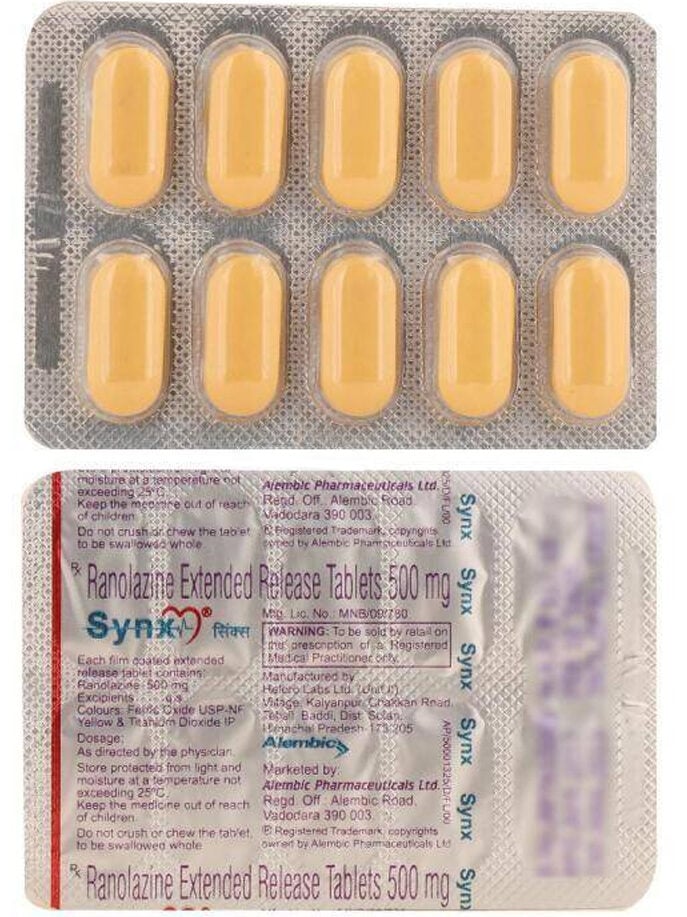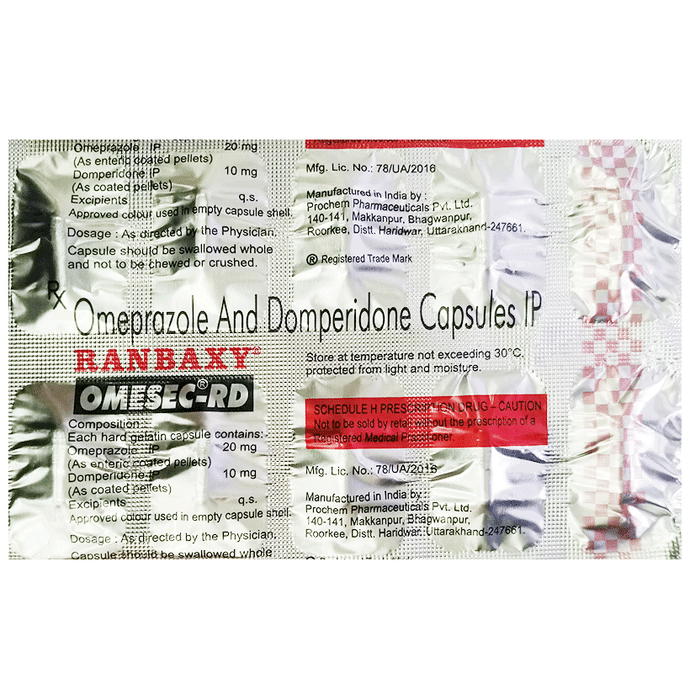revulant RANOLAZINE
Introduction to revulant
Revulant is a medication primarily used to treat chronic angina, a condition characterized by chest pain due to reduced blood flow to the heart. Revulant is available in tablet form and helps reduce the frequency of angina attacks while improving exercise tolerance.
Composition of revulant
The composition of Revulant includes active ingredients that work to improve blood flow to the heart, thereby enhancing its efficiency and reducing angina attacks. The specific components and their concentrations are determined by the manufacturer to ensure optimal therapeutic effects.
Uses of revulant
- Treatment of chronic angina
- Improvement of exercise tolerance
- Reduction in the frequency of angina attacks
Side effects of revulant
- Common side effects: dizziness, headache, constipation
- Serious side effects: potential impact on heart rhythm
Precautions of revulant
Before taking Revulant, it is important to discuss your medical history with your doctor, especially if you have existing heart conditions. Revulant may interact with other medications, potentially increasing side effects. Always follow your healthcare provider's advice regarding its use.
How to Take revulant
Revulant is typically taken as a tablet, twice daily, with or without food. The starting dose is usually 500 mg, which may be adjusted by your doctor. The maximum recommended dose is 1000 mg twice daily. Follow your doctor's instructions for the correct dosage and administration.
Conclusion of revulant
Revulant is a therapeutic medication used to manage chronic angina by improving heart efficiency and reducing angina attacks. It is manufactured in tablet form and should be used under medical supervision. Always consult your healthcare provider for personalized advice and to ensure safe use of Revulant.


Can I take Revulant with other prescription drugs?
Revulant can interact with certain medications, increasing the risk of side effects. Major interactions include drugs that affect heart rhythm, like certain antiarrhythmics. Moderate interactions include some antifungals and antibiotics. Always inform your doctor about all medications you're taking to avoid potential interactions and ensure safe treatment.

Can Revulant be taken safely while breastfeeding?
The safety of Revulant while breastfeeding is not well-established. It's unclear if the medication passes into breast milk. If you're breastfeeding or planning to breastfeed, talk with your doctor about the potential risks and benefits. They can help determine the best treatment plan for you and your baby.

Can Revulant be taken safely while pregnant?
The safety of Revulant during pregnancy is not well-established. Limited data is available, so it's important to weigh the benefits and risks with your doctor. If you're pregnant or planning to become pregnant, discuss with your doctor the safest way to manage your condition during this time.

Does Revulant affect appetite?
Revulant doesn't typically affect your appetite. Most people taking this medication don't notice changes in how hungry they feel or how much they want to eat. If you notice any unexpected changes in your appetite after starting Revulant, talk with your doctor. They can help determine if these changes are related to the medication.

Does Revulant affect mood?
Revulant doesn't typically cause mood changes, anxiety, or feelings of agitation. Most people take this medication without experiencing mental health effects. If you notice changes in your mood or mental well-being after starting Revulant, talk with your doctor. These symptoms might be related to something else, like stress or another health condition.

Does Revulant affect sleep?
Revulant doesn't typically cause sleep problems. Most people take this medication without experiencing changes in their sleep patterns. If you notice changes in how well you sleep after starting Revulant, talk with your doctor. Sleep problems might be related to something else, like another medication or a different health condition.

Does Revulant cause headaches?
Headaches are an occasional side effect of Revulant. Most people take this medication without experiencing headaches. If you do get mild headaches, staying well-hydrated and resting may help. You can also take over-the-counter pain relievers after checking with your doctor. For severe or persistent headaches, talk with your healthcare provider to determine if they might be related to Revulant.

Does Revulant cause stomach upset?
Revulant can occasionally cause stomach upset, including nausea and constipation. These side effects are usually mild. Taking the medication with food might help reduce discomfort. If you develop severe or persistent stomach issues, talk with your doctor. They can help determine if these symptoms are related to Revulant or if they might be caused by something else.

Does Revulant cause weight gain?
Revulant doesn't typically affect body weight. Most people taking this medication don't notice changes in their weight. If you experience unexpected weight changes while taking Revulant, talk with your doctor. They can help determine if these changes are related to the medication or if there might be another cause.

Does Revulant have adverse effects?
Adverse effects are unwanted reactions to a medication. Common adverse effects of Revulant include dizziness, headache, and constipation. Serious side effects can include heart rhythm changes. If you experience any new or worsening symptoms, contact your doctor immediately. They can help determine if these symptoms are related to Revulant and recommend appropriate action.

Does Revulant have any safety warnings?
Revulant has important safety warnings. It can affect heart rhythm, so it's not recommended for people with certain heart conditions. It may also interact with other medications, increasing the risk of side effects. Not adhering to these warnings can lead to serious health issues. Always discuss your medical history and current medications with your doctor before starting Revulant.

Does Revulant interfere with sexual function?
Revulant doesn't typically cause sexual side effects like erectile dysfunction or loss of libido. Most people take this medication without noticing changes in their sexual function. If you experience any persistent discomfort or changes in your sexual function while taking Revulant, talk with your doctor. Your doctor can help determine if your symptoms are related to the medication and recommend appropriate treatment to address any issues.

Does Revulant limit driving?
Revulant might affect your ability to drive safely in some cases. It can cause dizziness or light-headedness, especially when you stand up quickly. If you feel dizzy or faint after taking Revulant, avoid driving until these symptoms go away. Pay attention to how your body responds before getting behind the wheel.

Does Revulant make it hard to think or concentrate?
Revulant doesn't typically cause thinking problems or concentration difficulties. Most people take this medication without experiencing changes in their mental focus or memory. If you notice problems with your thinking after starting Revulant, talk with your doctor. These symptoms might be related to something else, such as another health condition.

Does Revulant make people tired or drowsy?
Revulant can occasionally cause tiredness or drowsiness, but it's not common. Most people take this medication without feeling unusually tired. If you notice you're feeling very sleepy or fatigued while taking Revulant, talk with your doctor. They can help determine what's causing your symptoms and recommend appropriate adjustments.

For how long do I take Revulant?
Revulant is usually a long-term medication for managing chronic angina, which is chest pain caused by reduced blood flow to the heart. You'll typically take Revulant every day as a lifelong treatment unless your doctor suggests otherwise. How long you'll need this medication depends on your body's response and any side effects you experience.

How does Revulant work?
Revulant works by improving blood flow to the heart, which helps it work more efficiently. It affects the heart's electrical activity, reducing the frequency of angina attacks. Think of it like adjusting the settings on a machine to make it run more smoothly. This helps reduce chest pain and improve exercise tolerance.

How do I dispose of Revulant?
To dispose of Revulant, bring unused medicine to a drug take-back program or collection site at a pharmacy or hospital. If you can't find a take-back program, you can throw it in the trash at home. First, take it out of its original container, mix it with something undesirable like used coffee grounds, seal it in a plastic bag, and throw it away.

How do I know if Revulant is working?
Revulant is used to treat chronic angina, which is chest pain caused by reduced blood flow to the heart. You'll know it's working if you experience fewer angina attacks and can engage in physical activities with less discomfort. Regular check-ups with your doctor are important to monitor your condition and adjust treatment as needed.

How do I take Revulant?
Revulant is usually taken twice daily, with or without food. Swallow the tablets whole; do not crush, chew, or split them. If you miss a dose, take it as soon as you remember unless it's almost time for your next dose. In that case, skip the missed dose and continue your regular schedule. Do not take two doses at once. Always follow your doctor's specific instructions regarding diet and fluid intake while taking this medication.

How long does it take for Revulant to start working?
Revulant begins working in your body shortly after you take it, but you may not notice all the benefits right away. It can take a few weeks to see significant improvements in angina symptoms. How quickly the medication works can depend on your overall health and other factors. Take it exactly as prescribed for the best results.

How should I store Revulant?
Store Revulant tablets at room temperature, away from moisture and light. Keep them in a tightly closed container. Don't store your medicine in humid places like bathrooms, where moisture could affect how well the medication works. Always store Revulant out of children's reach to prevent accidental swallowing.

Is it safe to drink alcohol while taking Revulant?
It's best to limit alcohol while taking Revulant. Alcohol can increase the risk of side effects like dizziness and lightheadedness. If you choose to drink, do so in moderation and be aware of how your body responds. Talk with your doctor about alcohol use while taking Revulant for personalized advice.

Is it safe to drink coffee or tea while taking Revulant?
You can drink coffee and tea while taking Revulant. There's no known interaction between caffeine and Revulant. However, caffeine can increase heart rate and blood pressure, so enjoy caffeinated drinks in moderation. Make sure you drink plenty of water throughout the day. If you have concerns, talk with your doctor.

Is it safe to exercise while taking Revulant?
You can exercise while taking Revulant, but be mindful of how your body responds. Revulant can cause dizziness, which might affect your ability to exercise safely. To exercise safely, start slowly and gradually increase intensity. If you feel dizzy or lightheaded, stop and rest. Talk with your doctor about your exercise routine while taking Revulant.

Is it safe to stop Revulant?
Revulant is often used long-term for chronic conditions like angina, which is chest pain caused by reduced blood flow to the heart. Stopping it suddenly can worsen your condition. Always talk with your doctor before stopping Revulant. They might suggest gradually reducing your dose or switching to a different medication to keep your condition under control.

Is Revulant addictive?
Revulant is not addictive or habit-forming. It doesn't cause dependency or withdrawal symptoms when you stop taking it. Revulant works by affecting the heart to improve blood flow, not by altering brain chemistry. You won't experience cravings for this medication or feel compelled to take more than prescribed.

Is Revulant effective?
Revulant is effective in treating chronic angina, which is chest pain caused by reduced blood flow to the heart. It works by improving blood flow to help the heart work more efficiently. Clinical studies show Revulant can reduce the frequency of angina attacks and improve exercise tolerance in people with this condition.

Is Revulant safe for the elderly?
Elderly individuals may be more sensitive to the effects of Revulant, especially dizziness and heart rhythm changes. It's important for older adults to be closely monitored by their doctor while taking this medication. Regular check-ups can help ensure the medication is working safely and effectively.

What are Revulant possible harms and risks?
Common side effects of Revulant include dizziness, headache, constipation, nausea, and fatigue. Significant adverse effects, although rare, can include QT prolongation (an abnormal heart rhythm), which may increase the risk of arrhythmias, especially in patients with heart problems. Revulant may also cause low blood pressure or liver enzyme abnormalities. It's important to contact a doctor if any severe side effects occur.

What are the most common side effects of Revulant?
Side effects are unwanted reactions that can happen when taking a medication. Common side effects of Revulant include dizziness, headache, and constipation. These effects vary from person to person. If you notice new symptoms after starting Revulant, they might be temporary or unrelated to the medication. Talk with your doctor before stopping any medication.

What disease or symptom is Revulant used for?
Revulant is primarily used to treat chronic angina, which is chest pain caused by reduced blood flow to the heart. It helps improve blood flow and reduce the frequency of angina attacks. Revulant is often used in combination with other therapies to manage this condition effectively.

What is Revulant?
Revulant is a medication used to treat chronic angina, which is chest pain caused by reduced blood flow to the heart. It belongs to the class of drugs called anti-anginals. Revulant works by improving blood flow to help the heart work more efficiently, reducing the frequency of angina attacks.

What is the usual dose of Revulant?
The usual starting dose of Revulant for adults is 500 mg twice daily. Your doctor may adjust your dose based on your response and tolerance. The maximum recommended dose is 1000 mg twice daily. Always follow your doctor's specific dosing instructions for your personal health needs.

Who should avoid taking Revulant?
Revulant should not be used by people with certain heart rhythm disorders or those taking specific medications that affect heart rhythm. It's also contraindicated in people with severe liver disease. Always consult your doctor about your medical history and current medications before starting Revulant to ensure it's safe for you.
Available in 2 variations

Revulant Tablet ER
strip of 10 tablet er

Revulant 1000mg Tablet
strip of 10 tablets
















.svg)
